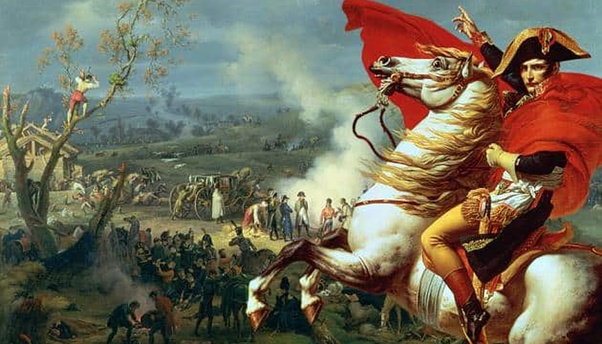Napoleon Bonaparte (1769–1821) – The Strategic Genius
1. Early Life and Humble Beginnings (1769–1785)
Napoleon Bonaparte was born on August 15, 1769, on the island of Corsica, just after it had been ceded to France by the Republic of Genoa. His family belonged to the Corsican nobility, but they were not wealthy, living a modest life. His father, Carlo Buonaparte, was a lawyer who maneuvered his way into favor with the French authorities. His mother, Letizia Ramolino, was a strong and disciplined woman, and Napoleon credited her with shaping his character and toughness.
Corsica had a history of resistance to outside rule, and this rebellious spirit permeated Napoleon’s early upbringing. However, his father’s decision to support the French overlords, rather than Corsican independence, paved the way for Napoleon’s future. At nine years old, Napoleon left Corsica to attend school in mainland France. He enrolled at Brienne-le-Château, a military academy, where his education focused on a mix of classical subjects, military theory, and practical skills such as fencing and horse riding.
Napoleon’s early years in France were challenging. As a Corsican, he was viewed as an outsider and faced bullying due to his accent and smaller physical stature. Despite these hardships, Napoleon threw himself into his studies, particularly excelling in mathematics and history, which would later serve him well in his military career. His teachers described him as serious, hardworking, and ambitious, traits that would define him throughout his life.
In 1784, Napoleon was accepted into the prestigious École Militaire in Paris, where he trained as an artillery officer. This technical and strategic education would later become the foundation of his military genius. Upon completing his studies in 1785, Napoleon was commissioned as a second lieutenant in the French Army. His entry into military service coincided with a period of profound upheaval in France, as the country edged closer to revolution.
2. The French Revolution and Napoleon’s Early Military Career (1789–1795)
The outbreak of the French Revolution in 1789 created chaos and opportunity. For a young officer like Napoleon, the revolution removed the rigid barriers that had traditionally kept men of noble but modest backgrounds from rising through the ranks of the military. The fall of the aristocracy and the subsequent purge of royalist officers meant that men like Napoleon, who demonstrated ability and loyalty to the revolutionary cause, could advance quickly.
Napoleon’s first real opportunity to distinguish himself came during the siege of Toulon in 1793. Royalists in the port city of Toulon had revolted against the revolutionary government and invited British forces to occupy the city. Napoleon, serving as a low-ranking officer in the artillery, was tasked with helping to recapture the city. Demonstrating exceptional tactical insight, he devised a plan to position artillery in key locations that eventually forced the British to withdraw. His success earned him a promotion to brigadier general at just 24 years old, a meteoric rise that reflected both his skill and the tumultuous nature of the time.
Over the next few years, Napoleon’s career continued to rise. He was appointed to command the French Army of the Interior, and his suppression of a royalist uprising in Paris in 1795 solidified his reputation as a capable and loyal officer of the Republic. Using a strategy of “grapeshot” (small cannonballs), he quickly and ruthlessly dispersed the royalist forces, a tactic that would become synonymous with his willingness to use overwhelming force to maintain order.
3. Italian Campaigns and the Rise to Power (1796–1799)
Napoleon Bonaparte’s Italian Campaigns, from 1796 to 1799, were a critical phase in his meteoric rise to power. At just 26 years old, Napoleon was appointed commander of the French Army of Italy, a position that marked the beginning of his military brilliance and his reputation as one of the greatest strategists in history. His Italian campaigns not only showcased his tactical genius but also laid the foundation for his political ascent.
Early Challenges and Strategic Brilliance
When Napoleon took command in 1796, the French Army of Italy was under-resourced and demoralized, facing well-supplied Austrian and Piedmontese forces. Undeterred, Napoleon reorganized and reinvigorated his troops, utilizing swift and audacious maneuvers to outflank his enemies. His strategy was simple but revolutionary: move quickly, divide enemy forces, and strike decisively. One of his key tactics was to concentrate his forces at critical points to overwhelm his opponents, a method known as concentration of force. This approach was showcased in battles such as Montenotte, Lodi, and Arcole, where his audacity and speed outmatched larger enemy armies.
In less than a year, Napoleon forced Austria and its Italian allies to the negotiating table, culminating in the Treaty of Campo Formio (1797). This treaty not only solidified French dominance in northern Italy but also redistributed territories in Europe, advancing the French Revolutionary cause. Napoleon’s successes in Italy earned him widespread fame in France, elevating him from a talented general to a national hero.
Establishing the Cisalpine Republic
During the Italian Campaigns, Napoleon also demonstrated his political acumen. He reorganized the conquered Italian territories into satellite states, the most significant of which was the Cisalpine Republic, based in Milan. By doing so, Napoleon not only secured French influence in Italy but also spread Revolutionary ideals, consolidating his control over the region and securing key allies.
His handling of local politics in Italy showed that Napoleon was not just a soldier but also a statesman. His ability to balance military and political goals was instrumental in his eventual rise to power in France.
The Egyptian Campaign and Coup of 18 Brumaire
Following his Italian successes, Napoleon was given command of a new campaign in Egypt in 1798. The aim was to strike at British trade routes and undermine their empire, but the campaign ultimately ended in strategic failure with the defeat at the Battle of the Nile. Despite this setback, Napoleon’s reputation in France remained largely intact due to his ability to control the narrative, keeping his losses out of the spotlight and emphasizing his victories in Egypt.
While in Egypt, the political situation in France deteriorated, with the government (the Directory) struggling to maintain stability. Sensing an opportunity, Napoleon abandoned his army in Egypt and returned to France in 1799. Upon his return, he capitalized on widespread dissatisfaction with the Directory, orchestrating a coup on November 9, 1799 (18 Brumaire, according to the French Revolutionary calendar). This coup effectively ended the French Revolution and established Napoleon as First Consul of France, marking the beginning of his path to absolute power.
Legacy of the Italian Campaigns
Napoleon’s Italian Campaigns were a turning point in his career, propelling him from relative obscurity to one of the most powerful figures in Europe. His military victories in Italy solidified his status as a strategic genius, while his ability to manage conquered territories demonstrated his political savvy. These campaigns also introduced several key elements of Napoleonic warfare: rapid movement, flexible tactics, and the exploitation of enemy weaknesses.
The lessons Napoleon learned during his Italian Campaigns would inform his future strategies in battles across Europe. Moreover, his success in Italy contributed to the decline of the old European order, paving the way for his eventual imperial ambitions. By the end of the Italian Campaigns, Napoleon had not only reshaped the political landscape of Europe but also set the stage for his own rise as Emperor of France.
4. The Egyptian Campaign and the Coup of 18 Brumaire (1798–1799)
In 1798, Napoleon launched a campaign in Egypt, seeking to undermine British influence in the region and open a path to French domination of the East. Though his military objectives were not fully realized, the campaign further enhanced Napoleon’s reputation. He captured Alexandria, defeated the Mamluk forces at the Battle of the Pyramids, and secured Cairo. However, his navy suffered a crippling defeat at the hands of the British under Admiral Horatio Nelson in the Battle of the Nile, stranding Napoleon and his army in Egypt.
Despite the military setbacks, Napoleon brought back a wealth of scientific knowledge and cultural artifacts from his Egyptian campaign, including the famous Rosetta Stone. This scientific and cultural engagement showcased his ambition to be seen not just as a military conqueror but as a man of the Enlightenment, contributing to the progress of knowledge.
While Napoleon was still in Egypt, France was on the verge of collapse. The political situation back home was unstable, and the ruling Directory was losing control. Sensing an opportunity, Napoleon abandoned his army in Egypt and returned to France in 1799. Upon his return, he quickly allied himself with key political figures and, in a bloodless coup known as the Coup of 18 Brumaire, overthrew the Directory and established the Consulate. At the age of 30, Napoleon was now the most powerful man in France, holding the title of First Consul.
5. Napoleon as First Consul and Reformer (1799–1804)
As First Consul, Napoleon set about consolidating his power and stabilizing France, which had been ravaged by a decade of revolution and war. He was not just a military leader but a pragmatic and visionary statesman. Napoleon initiated a series of reforms that would have a lasting impact on France and beyond. His administrative reforms centralized power in the hands of the state, making the government more efficient and effective.
One of his most important reforms was the introduction of the Napoleonic Code in 1804. This comprehensive set of laws replaced the patchwork of feudal laws that had governed France before the Revolution. The Napoleonic Code enshrined key revolutionary principles such as equality before the law, the abolition of feudal privileges, and the protection of private property. However, it also reinforced patriarchal authority, limiting the rights of women and reaffirming the power of fathers over their families.
In addition to legal reforms, Napoleon reorganized the French education system, established the Bank of France, and initiated public works projects to improve infrastructure. These reforms helped to stabilize the French economy and create a more modern and centralized state. Napoleon also pursued a policy of reconciliation with the Catholic Church, signing the Concordat of 1801, which restored relations between the Church and the state while ensuring that the Church remained subordinate to the government.
6. The Coronation of Napoleon and the Establishment of the Empire (1804)
By 1804, Napoleon had effectively become the ruler of France, but he sought to formalize his power and create a dynasty. In December of that year, he crowned himself Emperor of the French in a lavish ceremony at Notre-Dame Cathedral in Paris. By crowning himself, Napoleon signaled that his authority came from his own achievements rather than divine right or tradition. The establishment of the Napoleonic Empire marked the end of the revolutionary republic and the beginning of a new era of imperial rule.
As Emperor, Napoleon continued to expand French influence across Europe through a series of military campaigns. His armies defeated coalitions of European powers, including Austria, Prussia, and Russia. The Battle of Austerlitz in 1805 is often regarded as his greatest military victory, where he outmaneuvered and decisively defeated a combined Austrian and Russian force. This victory solidified his dominance over Central Europe.
However, his relentless pursuit of expansion also created enemies. Britain remained his most persistent foe, and the Continental System, a blockade designed to weaken British trade, only deepened tensions across Europe. Napoleon’s imperial ambitions alienated many European powers, setting the stage for future conflicts.
7. The Invasion of Russia and the Beginning of the Downfall (1812)
Napoleon’s ambition reached its peak in 1812 when he launched an invasion of Russia. This decision would prove to be the turning point in his career and the beginning of his downfall. Napoleon assembled the Grande Armée, one of the largest military forces ever gathered, with around 600,000 men. His goal was to force Russia, under Tsar Alexander I, to comply with the Continental System and submit to French dominance in Europe.
The campaign initially proceeded as








